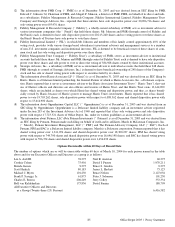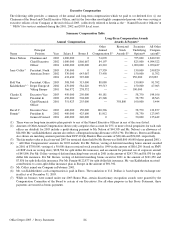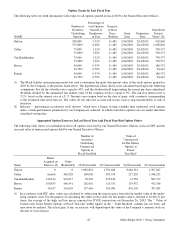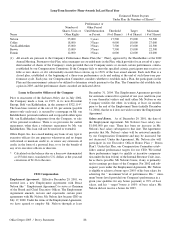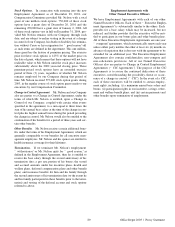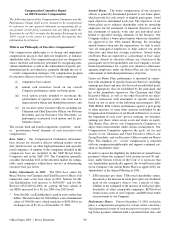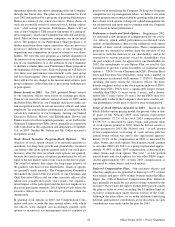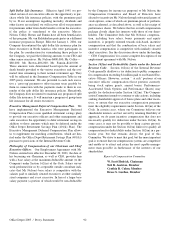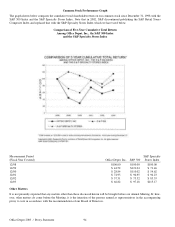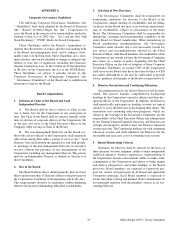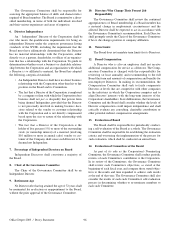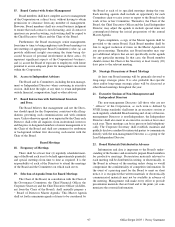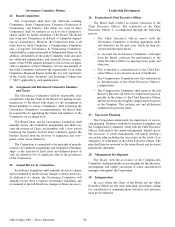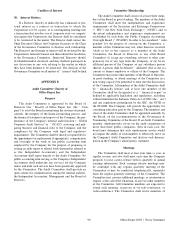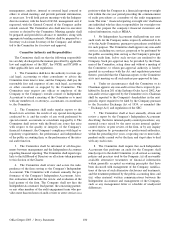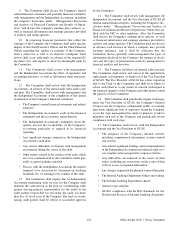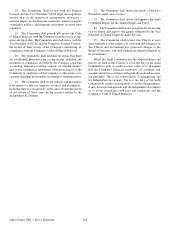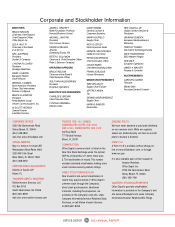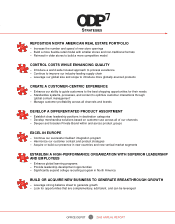Office Depot 2003 Annual Report Download - page 97
Download and view the complete annual report
Please find page 97 of the 2003 Office Depot annual report below. You can navigate through the pages in the report by either clicking on the pages listed below, or by using the keyword search tool below to find specific information within the annual report.95 Office Depot 2003 / Proxy Statement
APPENDIX A
Corporate Governance Guidelines
The following Corporate Governance Guidelines (the
“ Guidelines”) have been adopted by the Board of Directors
(the “ Board”) of Office Depot, Inc. (the “ Corporation”) to
assist the Board in the exercise of its responsibilities under the
Sarbanes-Oxley Act of 2002 (the “ Act”) and the New York
Stock Exchange (“ NYSE”) Rules for Listed Companies.
These Guidelines reflect the Board’s commitment to
monitor the effectiveness of policy and decision-making both
at the Board and management level, and to enhance stock-
holder value over the long term. These Guidelines are a state-
ment of policy and are not intended to change or interpret any
federal or state law or regulation, including the Delaware
General Corporation Law, or the Certificate of Incorporation
or By-laws of the Corporation, the Act or the NYSE Rules.
These Guidelines are subject to periodic review by the
Corporate Governance & Nominating Committee (the
“ Governance Committee”) of the Board and to modification
from time to time by the Board.
Board Compensation
1. Selection of Chair of the Board and Lead
Independent Director
A. The Board shall be free to choose its Chair in any
way it deems best for the Corporation at any given point in
time. The Chair of the Board shall be selected annually at the
time of election of corporate officers of the Corporation. He
or she may also serve as the Chief Executive Officer of the
Company while serving as Chair of the Board.
B. The non-management Directors on the Board (i.e.
those who are not officers of the Corporation) shall separately
select from among their ranks a person to serve as the “ Lead
Director,”who shall develop the agendas for, and shall preside
at, meetings of the non-management Directors in executive
session, without the presence of any management of the
Corporation, including any management Director. This person
must be an Independent Director as defined in Section 6 of
these Guidelines.
2. Size of the Board
The Board believes that it should generally have no fewer
than 9 and no more than 13 Directors subject to the provisions of
the Corporation’s Certificate of Incorporation and its By-laws.
This range permits diversity of experience without hindering
effective discussion or diminishing individual accountability.
3. Selection of New Directors
The Governance Committee shall be responsible for
nominating candidates for election to the Board at the
Corporation’s annual meeting of stockholders and for filling
vacancies on the Board that may occur between annual meet-
ings of stockholders, subject to concurrence of the entire
Board. The Governance Committee shall be responsible for
identifying, screening and recommending candidates to the
entire Board for Board membership. When formulating its
Board membership recommendations, the Governance
Committee shall consider (but is not necessarily bound by)
any advice and recommendations offered by the Chief
Executive Officer, other Board members, the stockholders of the
Corporation or any outside advisors the Governance Committee
may retain. As a matter of policy, beginning with the Chief
Executive Officer on the date of adoption of these Corporate
Governance Guidelines, no former CEO of the Corporation
shall serve on the Board after his or her term of office as CEO
has ended, although he or she may be called upon to provide
advice, guidance and insights to the Board as requested by it.
4. Director Orientation and Continuing Education
An orientation process for all new Directors will be main-
tained. This process includes comprehensive background
briefings by the Corporation’s executive officers and other des-
ignated officers of the Corporation. In addition, all Directors
shall periodically participate in briefing sessions on topical
subjects to assist the Directors in discharging their duties. The
orientation and continuing education programs, which are
subject to the oversight of the Governance Committee, are the
responsibility of the Chief Executive Officer and administered
by the General Counsel/Corporate Secretary. All Directors are
strongly encouraged to attend at least one Director education
session each year. The Corporation shall pay for such continuing
education sessions and shall reimburse the Directors for the
reasonable and necessary costs of attending such sessions.
5. Board Membership Criteria
Nominees for Director shall be selected on the basis of
their character, wisdom, judgment, ability to make independent
analytical inquiries, business experiences, understanding of
the Corporation’s business environment, ability to make a time
commitment to the Corporation and ability to bring unique
and diverse perspectives and understandings to the Board
processes. Board members are expected to rigorously pre-
pare for, attend, and participate in all Board and applicable
Committee meetings. Each Board member is expected to
ensure that other existing and planned future commitments do
not materially interfere with the member’s service as an out-
standing Director.


